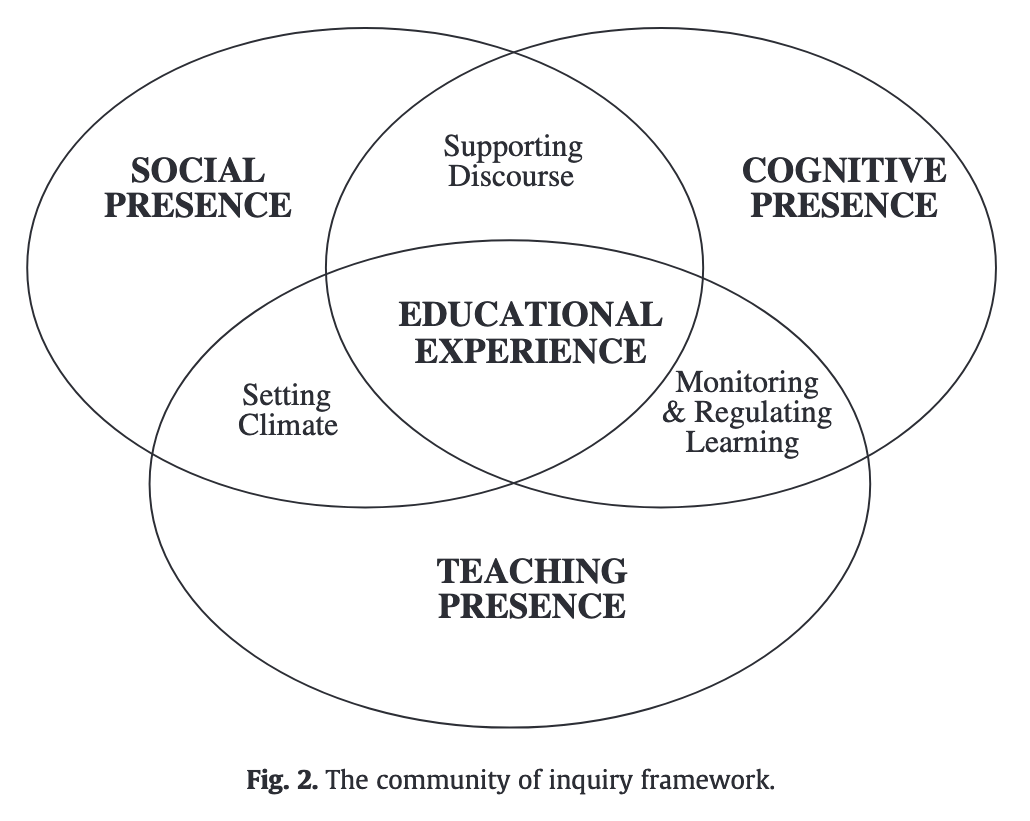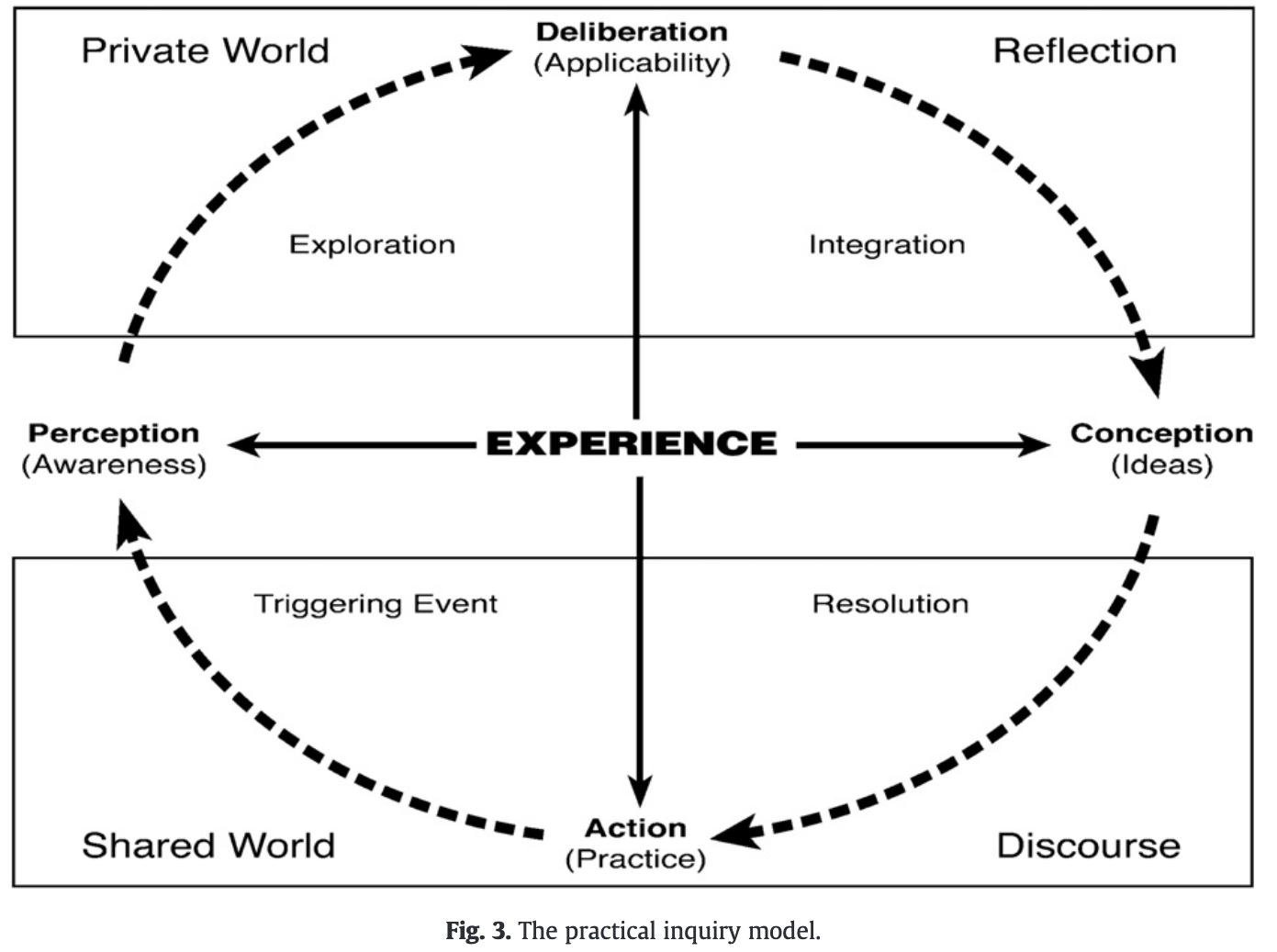Assessing metacognition in an online community of inquiry
Authors: Zehra Akyol, D. Randy Garrison
Date: 2011-07-01
Metacognition is an important aspect of human intelligence and higher learning. There is the recognition that metacognition is not just a private internal activity but also socially situated. In this context, the purpose of this research is to develop and validate a metacognitive construct that provides the opportunity to assess metacognition in online discussions. Furthermore, the Community of Inquiry (CoI) theoretical framework provided the conceptual coherence to construct, operationalize and interpret metacognition in an online collaborative inquiry. The results provided evidence of metacognition indicators in student discussion postings and the frequency of these indicators increased over time.
- With this in mind, the purpose of this study is to develop and validate a metacognitive construct grounded in the educational psychology literature and that reflects the learning process specifically in an online community of inquiry. (@akyol2011, 183)
- our goal is to explicate how students demonstrate metacognition during discourse in an online learning environment. (@akyol2011, 183)
- The context of this research was an online graduate course on the topic of “Blended Learning.” There were 16 students enrolled in the course. The course was designed and developed applying the strategies identified by the CoI theoretical framework to develop social, teaching and cognitive presence. For example, in order to develop effective teaching presence, students shared the roles and responsibilities of the course instructor by leading the online discussions. There were nine weeks of online discussions, a final course redesign project, and article reviews comprised the final grades of the students. The first, fifth and ninth week of online discussion were chosen to assess metacognition in an online community of inquiry. This also enabled the researchers to observe possible changes in metacognition over time. (@akyol2011, 187)
- Transcript analysis was applied using the indicators developed for each dimension of the metacognitive construct described previously. (@akyol2011, 187)
- Metacognition was coded for knowledge, monitoring and regulation of cognition. The unit of analysis was each single message and each message was coded for all three dimensions of metacognition. (@akyol2011, 187)
- The ability to explore metacognition through written communication and the metacognitive construct developed in this study is promising and has the potential to enhance our understanding of metacognition in an online community of inquiry. (@akyol2011, 188)
- Knowledge of cognition was observed least in the online discussions and decreased over time. (@akyol2011, 188)
- One of the important findings of this study is the increase in regulation of cognition over time. In other words, students became metacognitively mature through explaining, questioning, clarifying, justifying or providing strategies reciprocally within a community of inquiry. (@akyol2011, 188)
- Self-efficacy becomes shared efficacy in a co-regulated environment. Efficacy is seen to be manifested through the collaborative and reflective processes of the inquiry process and the dimensions of the metacognitive construct. (@akyol2011, 189)
- Metacognition is inherent to communicating, explaining, and justifying one's thinking. (@akyol2011, 189)
- How can peer feedback and questioning strategies enhance metacognitive skills?
- Communities have an enormous advantage to support metacognition through questioning, feedback and direction. (@akyol2011, 189)
- How does self-regulation relate to metacognition in a community of inquiry?
- participation in deep levels of discussion in online discussion forums require metacognitive strategies (@akyol2011, 183)
- Why is social interaction important for metacognitive development?
- a lack of reliable instruments, frameworks or models for use in the identification or promotion of MC [metacognition] in the context of... online discussions (@akyol2011, 183)
- How does metacognition function in online learning differently than in face-to-face settings?
- Metacognition must, therefore, go beyond simply thinking about thinking and awareness. Inquiry-based metacognition must include self-corrective strategies which make it an essential element of critical thinking and higher learning. (@akyol2011, 184)
- metacognition consists of knowledge and regulatory skills that are used to control one's cognition (@akyol2011, 184)
- Recognizing the importance of distinguishing between static and dynamic aspects of metacognition, herethe structure of metacognition in an online community is described as constituting of three interdependent dimensions—knowledge of cognition, monitoring of cognition, and regulation of cognition (@akyol2011, 184)
- Metacognition in a community of inquiry is a collaborative process where internal and external conditions are being constantly assessed. (@akyol2011, 184)
- What does it mean for metacognition to be socially situated in an online learning environment?
- Knowledge of cognition refers to awareness of self as a learner in a broad sense. (@akyol2011, 184)
- The reflective dimension of metacognition is the awareness of the thinking and learning process. (@akyol2011, 184)
- The regulation dimension of metacognition is on the action dimension of the learning experience. (@akyol2011, 184)
- The CoI framework provides the conceptual coherence to guide and interpret metacognitive research within an online community of inquiry. (@akyol2011, 185)

- How do the three dimensions of metacognition interact in a Community of Inquiry (CoI)?
- Cognitive presence represents the cycle and the structure of the inquiry process, while teaching presence is essential to describe the regulatory roles and responsibilities of an online student in a community of inquiry. (@akyol2011, 186)
- How does cognitive presence relate to metacognition in online discussions?
- Cognitive presence is reflective of a collaborative constructivist perspective. (@akyol2011, 186)
- Goes on to describe the practical inquiry model: triggering event > exploration > integration > resolution.
- It enables and encourages the construction of personal meaning as well as shaping and confirming mutual understanding. (@akyol2011, 186)
- How does teaching presence promote metacognition in student-led discussions?
- In a recent study in a community of inquiry context, student facilitation of online discussions was found to be valuable in terms of metacognition and enhancing understanding by students (Akyol & Garrison, 2009). (@akyol2011, 186)

- The practical inquiry model.
Akyol, Z., & Garrison, D. R. (2011). Assessing metacognition in an online community of inquiry. The Internet and Higher Education, 14(3), 183–190. https://doi.org/10.1016/j.iheduc.2011.01.005